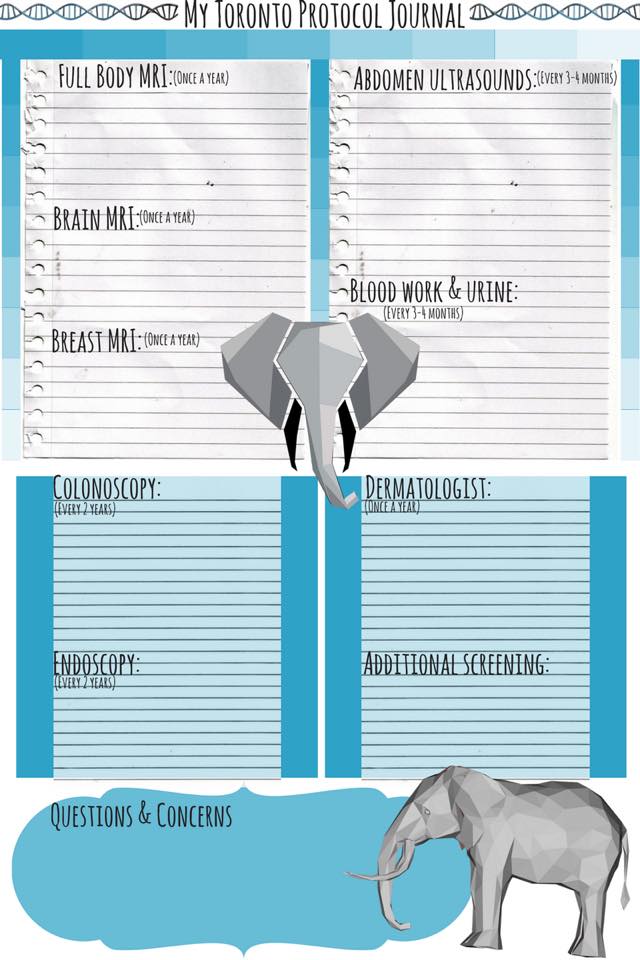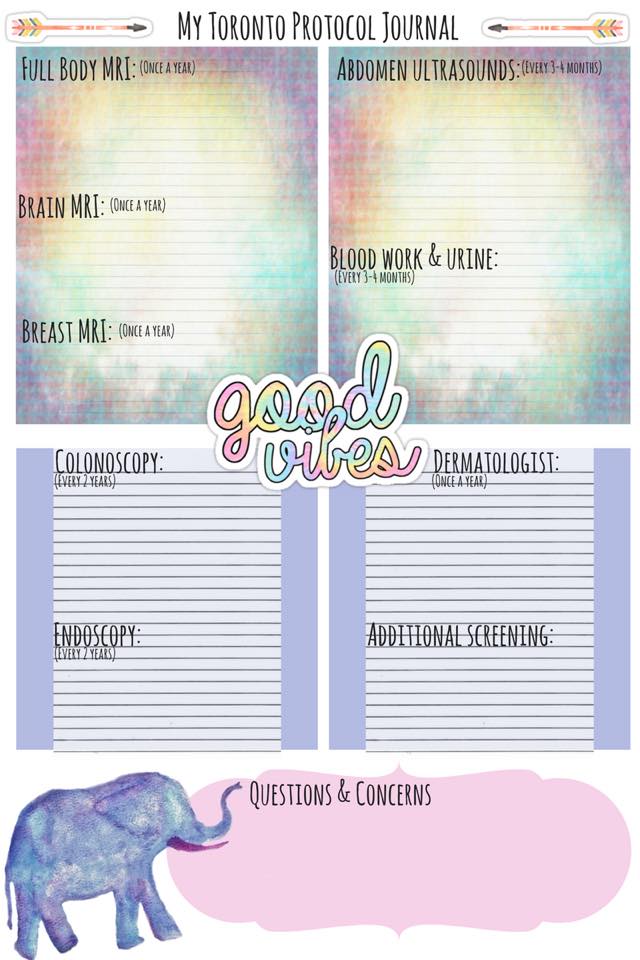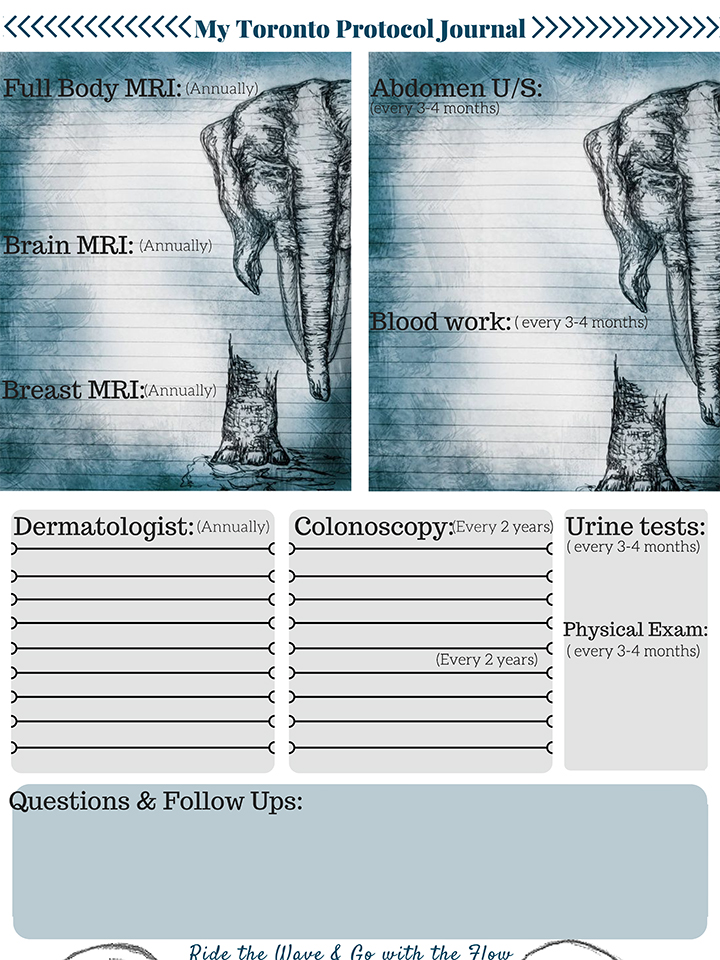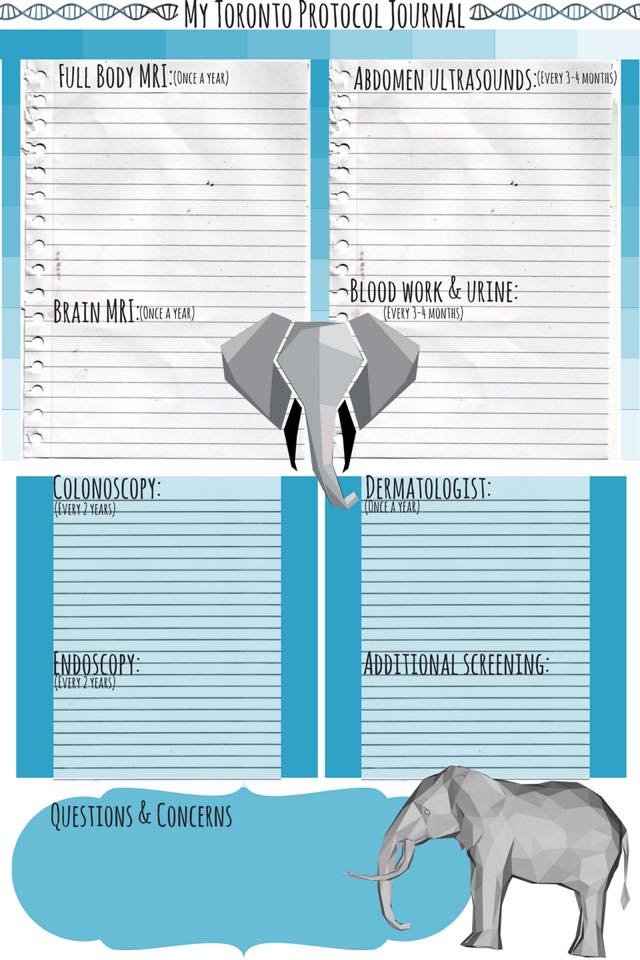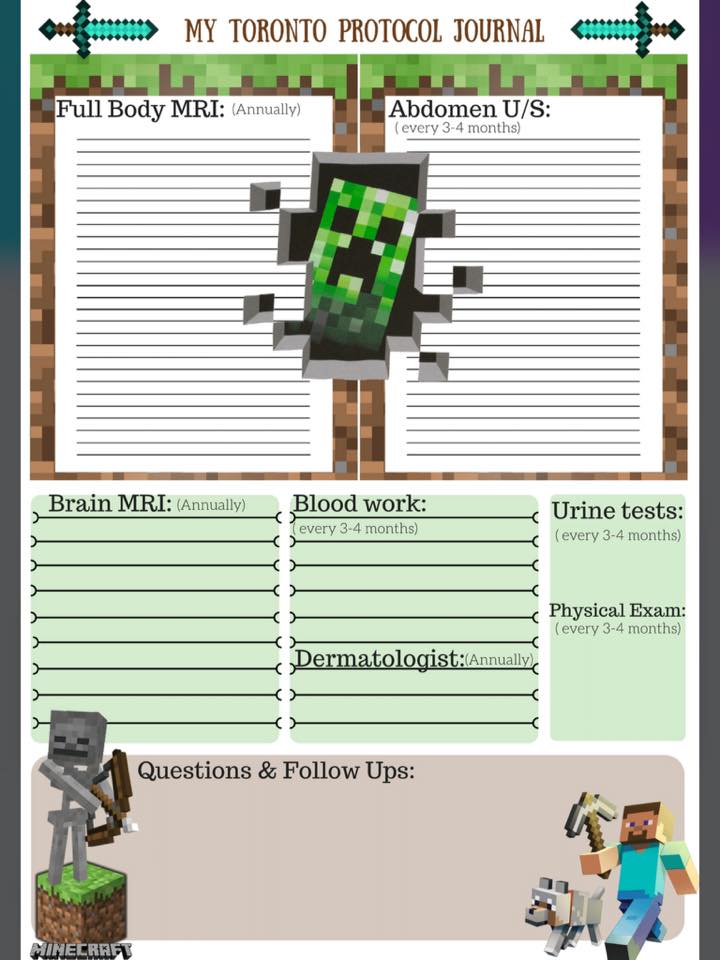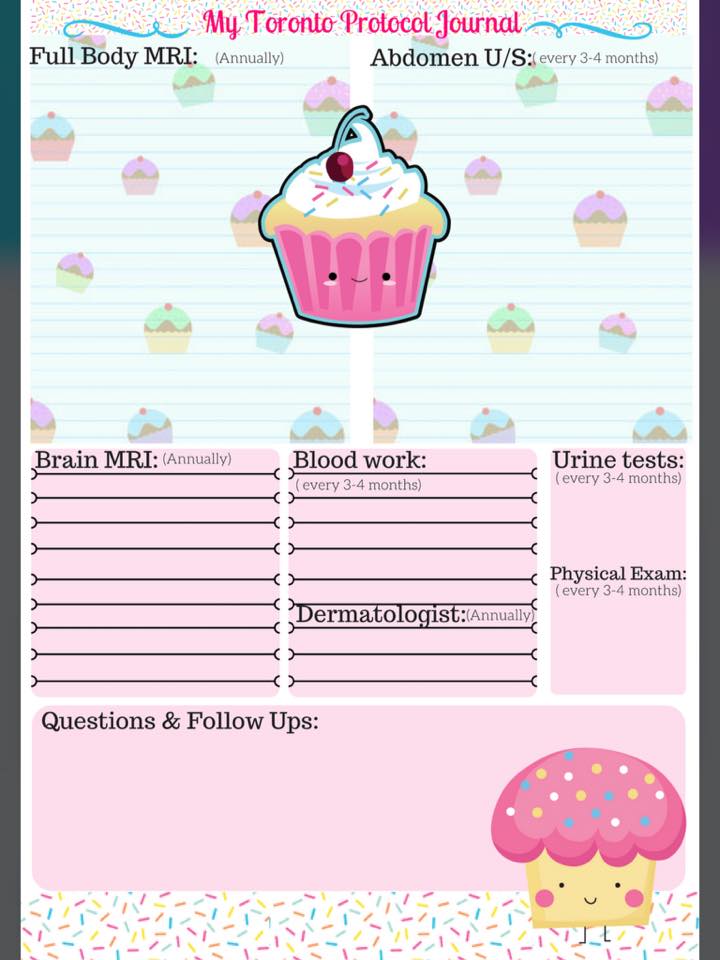Resources
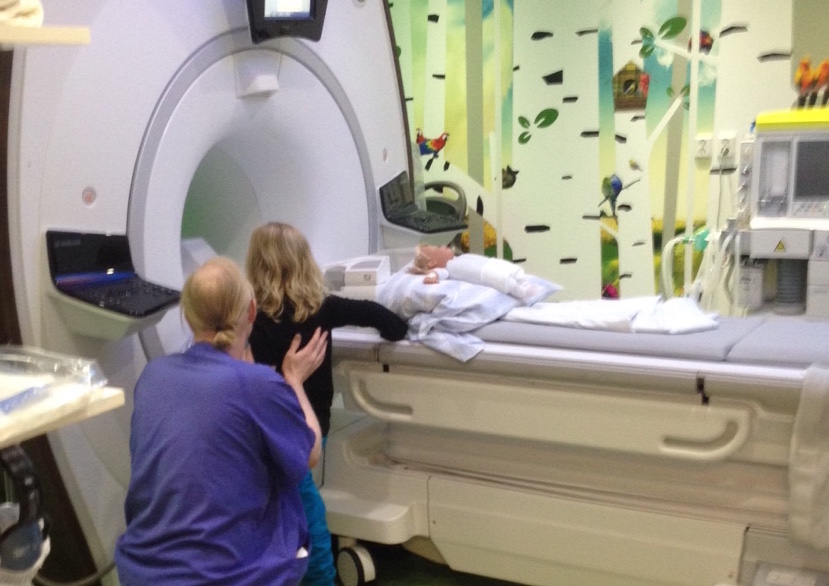
SCREENING
While there is still a psychological cost to learning that you carry a p53 mutation, many find benefit, both physically and psychologically, to screening. Screening allows for cancer to be found earlier in more treatable stages, which is empowering. There is also the psychological reassurance that come when nothing remarkable is found.
Consider taking the following screening guidelines comparison to your local doctor or to submit in an appeal to your insurance company if you find that screening is not covered. Your genetic counselor might want to customize the screening recommendations, taking into account your family cancer history.
The Toronto Protocol
Toronto Protocol Journals!
Living LFS member Lisa Wickens was kind enough to make these awesome journals to help you keep track of your scans, dates, questions and everything else to do with your Toronto Protocol screening. Click the images to download the PDFs. Thank you Lisa!
CLINICAL TRIALS & STUDIES
Participating in clinical trials is a way to receive cutting edge care while at the same time increasing medical knowledge and potentially helping to bring new and lifesaving treatments to future survivors. Each trial has a unique set of risks and benefits. Federal regulations are in place to ensure the ethics and safety of clinical trials. Some relevant trials are listed below. If you are interested in participating in a clinical trial, be sure to discuss it with your doctor.
Living LFS has partnered with Carebox to provide patients, caregivers, and healthcare professionals an easy way to search and match to clinical trials specifically related to Li-Fraumeni syndrome and cancer. You can browse a comprehensive list of all trials relevant to those with LFS, or simply fill out a short online questionnaire to identify clinical trials near you that fit your specific diagnosis, stage and treatment history.
The goal of the LFS Study is to evaluate those with known or suspected TP53 mutations and their families. They do this by collecting data, blood and tumor samples to better understand how cancers develop. Includes Physical exam, imaging studies and laboratory tests. Ongoing monitoring and developing effective prevention strategies. Offering risk assessment, counseling, testing and evaluating the psychosocial impact on members of LFS families. Developing evidence based information on how best to care for people affected with or at risk for LFS cancers.
To evaluate and quantify cumulative cancer risk in LFS and LFL individuals, develop a cancer screening program. identify genetic and environmental factors that modify cancer risk, find risk reducing options, evaluate the psychological and social effects of LFS on individuals and family members, to create a biospecimen repository of LFS related materials for research.
The Li-Fraumeni & TP53: Understanding & Progress (LiFT UP) study is currently enrolling. This study is funded by the National Institutes of Health/National Cancer Institute in collaboration with Dana-Farber Cancer Institute, City of Hope, and Baylor College of Medicine.
Any person with a TP53 mutation is eligible to participate in this study! One of the main purposes of this study is to gain a better understanding of cancer risks associated with TP53 mutations.
Resources Recommended by the Living LFS Community
LFS General Information
LFS Informational Rack Card – created by Living LFS, this card provides an overview of Li-Fraumeni syndrome and the support available to the LFS community. Available in English | Dutch | German | Portuguese | French | Spanish
Genetics Home Reference
Information on LFS, testing, and screening. This site also offers links to educational resource.
MD Anderson LFS Fact Sheet
Printable document for your reference.
Dana Farber Cancer Genetics
Dana Farber Cancer Genetics Program for LFS.
LFS Mental Health Fact Sheet Intended for mental health clinicians who are unfamiliar with LFS and the psychosocial challenges, members of the LFS community can use this fact sheet during any therapy/GC sessions as an education tool to give their provider to alleviate some of the burden in “always having to be the health educator about LFS” for providers.
LFS Conference at NIH 2010
A video of the Conference held at the NIH about LFS, p53 mutations, genetic testing, screening and future goals.
The George Pantziarka TP53 Trust
The George Pantziarka TP53 Trust helps families with Li Fraumeni Syndrome and other TP53 disorders.
LFSA
LFS Association provides a wide range of information, advocacy, and support services for individuals and families with Li-Fraumeni Syndrome.
Pediatrics
Make-A-Wish America
Make-A-Wish® grants the wish of a child diagnosed with a life-threatening medical condition in the United States and its territories.
The National Children’s Cancer Society
The National Children’s Cancer Society (NCCS) provides emotional, financial and educational support to children with cancer, their families and survivors.
The National Children’s Cancer Society
The National Children’s Cancer Society (NCCS) provides emotional, financial and educational support to children with cancer, their families and survivors.
Alex’s Lemonade Stand Foundation
ALSF encourages and empower others, especially children, to get involved and make a difference for children with cancer. ALSF raises money and awareness of childhood cancer causes, primarily research into new treatments and cures.
Flashes of Hope
Flashes of Hope raises funds to accelerate a cure for children’s cancer while honoring the unique life and memories of every child fighting cancer.
Robot Music: A Story for Kids with Li-Fraumeni Syndrome and Other Cancer Predispositions
This children’s book by Amy Peasgood is a lighthearted introduction to Li-Fraumeni Syndrome (LFS). Reading this book with young children creates a safe space for questions and conversation. All profits from the sale of Robot Music will be donated towards LFS research and initiatives that support the LFS community.
LEGAL
The DRLC is a 501(c)(3) non-profit, public interest advocacy organization that champions the civil rights of people with disabilities as well as those affected by cancer. DRLC is a leader in bringing cutting-edge cases to court and in winning victories to protect and to expand the rights of people to help eliminate discrimination and other legal barriers.
A program of the Disability Rights Legal Center, the CLRC provides information through its national telephone assistance line, outreach programs and community activities to educate and to support cancer patients, their families, healthcare professionals and advocates on matters like maintaining employment through treatment, accessing healthcare and government benefits, taking medical leave and estate planning. For a person with a cancer diagnosis, these issues often result in worry and confusion, which can be overwhelming. When left unaddressed, patients may survive treatment to find their homes, jobs or insurance coverage gone. When information is readily and easily accessible, quality outcomes for patient survivorship improve as stress and anxiety decrease.
Financial
Cancer Financial Assistance Coalition
CFAC is a coalition of organizations helping cancer patients manage their financial challenges.
American Cancer Society
Health insurance and financial assistance information for cancer patients.
Sparrow Clubs USA
Sparrow Clubs USA exists to set the stage for simple, yet heroic acts of kindness in schools and youth culture, through the concept of empowering kids to help kids in medical need. Sparrow Clubs USA is primarily a Pacific Northwest charity, serving in the states of Oregon and Washington.
Complementary Therapies
Memorial Sloan Kettering Cancer Center
Integrative Medicine : Herbs
Practice guidance from LFS Patient Navigator & MSC Facilitator Amelia Coffaro
Young Adults
The SAMFund
The SAMFund supports young adult cancer survivors in the United States as they recover from the financial impact of cancer treatment. Through direct financial assistance and free online support and education, The SAMFund helps young adults move forward towards their personal, professional, and academic goals.
First Descents
First Descents provides life-changing outdoor adventures for young adults (age 18-39) impacted by cancer.
Young Survival Coalition
Young women facing breast cancer together.
Genome Generation
Genome Generation encourages conversation with young adults, from all over the world, to understand their family history.
Travel
Ronald McDonald House
The mission of Ronald McDonald House Charities (RMHC) is to create, find and support programs that directly improve the health and well being of children.
American Cancer Society Hope Lodge
Hope Lodge offers cancer patients and their caregivers a free place to stay when their best hope for effective treatment may be in another city.
Joe’s House
Joe’s House is a nonprofit organization providing an online nation-wide list of places to stay to assist cancer patients and their families find lodging near treatment centers.
National Patient Travel Center
The National Patient Travel Center provides information about all forms of charitable, long-distance medically-related transportation.
Corporate Angel Network
Corporate Angel Network helps cancer patients access the best possible treatment for their specific type of cancer by arranging free travel to treatment across the country using empty seats on corporate jets.
Air Charity Network
Air Charity Network coordinates free air transportation for children and adults with medical or compelling humanitarian needs.
Healthcare Hospitatlity Network, Inc
HHN is a nationwide professional association of nonprofit organizations that provide lodging and support services to patients, families, and their loved ones who are receiving medical treatment far from their home communities.
Southwest Airlines
Through the Southwest Airlines Medical Transportation Grant Program (MTGP) Southwest provides complimentary, round trip tickets to nonprofit hospitals and medical transportation organizations. Southwest allows participating nonprofit hospitals and medical transportation nonprofit organizations the freedom to determine how to distribute the tickets to patients and/or caregivers.
BOOKS
A Kick-Ass Fairy: A Memoir by Linda Zercoe
LFS and Living My Best by Quinn. McGee, Courtney, Schneider (a booklet for kids ages 8-13)
Star Throwers’ Guide to Cancer By Pan Pantziarka
For the Love of George by Irene Kappes
Support
American Psychosocial Oncology Society
APOS’s Helpline is a national resource to help people with cancer and their caregivers find emotional support in their own communities.
APOS’ Toll-Free HELPLINE – 1-866-276-7443 (1-866-APOS-4-HELP)
Caring Bridge
CaringBridge transforms your personal connections into support when you need it most. By creating a free CaringBridge website, people in a time of need can share updates, photos and videos, connecting with friends and family who care and want to help.
Lotsa Helping Hands
Create a care community when you need it most. With the Help Calendar, you can post requests for support – things like meals for the family, rides to medical appointments, or just stopping by to visit.
Maggie’s Centre
Maggie’s Centres are available to anyone with any type of cancer and their families and friends, offering the practical, emotional and social support that people with cancer need. Centres are located in the United Kingdom only
SuperSibs
SuperSibs Comfort and Care program is free and provides mailings to children ages 4-18 who live in the United States and have (or had) a sibling with cancer. SuperSibs also offers age appropriate bereavement services.
